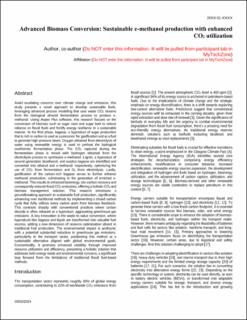| dc.description.abstract | Amid escalating concerns over climate change and emissions, this study presents a novel approach to develop sustainable fuels, leveraging advanced process modeling that uses waste CO2 streams from the biological ethanol fermentation process to produce e-methanol. Using Aspen Plus software, this research focuses on the conversion of biomass such as sugar cane and sugar beet to reduce reliance on fossil fuels and fortify energy resilience in a sustainable manner. In the first phase, bagasse, a byproduct of sugar production that is rich in carbon is used as a precursor for gasification and as a fuel to generate high-pressure steam. Oxygen obtained from electrolysis of water using renewable energy is used to preheat the biological exothermic fermentation phase. The CO2 captured during the fermentation phase is mixed with hydrogen obtained from the electrolysis process to synthesize e-methanol. Lignin, a byproduct of second-generation bioethanol, and surplus bagasse are identified and converted into ethanol and e-methanol, respectively, optimizing the use of CO2 from fermentation and O2 from electrolysis. Lastly, gasification of the carbon-rich bagasse serves to further enhance methanol production, culminating in the generation of enriched e-methanol. This results in enhanced bioenergy, bio-carbon recovery and consequently reduced fossil CO2 emissions, offering a holistic CO2 and biomass management solution. This research introduces a groundbreaking approach to sustainable fuel production, significantly advancing over traditional methods by implementing a closed carbon cycle that fully utilizes every carbon atom from biomass feedstock. This contrasts sharply with conventional practices where carbon dioxide is often released as a byproduct, aggravating greenhouse gas emissions. A key innovation is the waste-to-value conversion, where byproducts like bagasse and lignin are transformed into valuable fuel sources, adding a new dimension of resource optimization absent in traditional fuel production. The environmental impact is profound, with a potential substantial reduction in greenhouse gas emissions, particularly in the transport sector, positioning this method as a sustainable alternative aligned with global environmental goals. Economically, it promises enhanced viability through improved resource utilization and efficiency, presenting a holistic solution that addresses both energy needs and environmental concerns, a significant leap forward from the limitations of traditional fossil fuel-based methods. | en_US |

